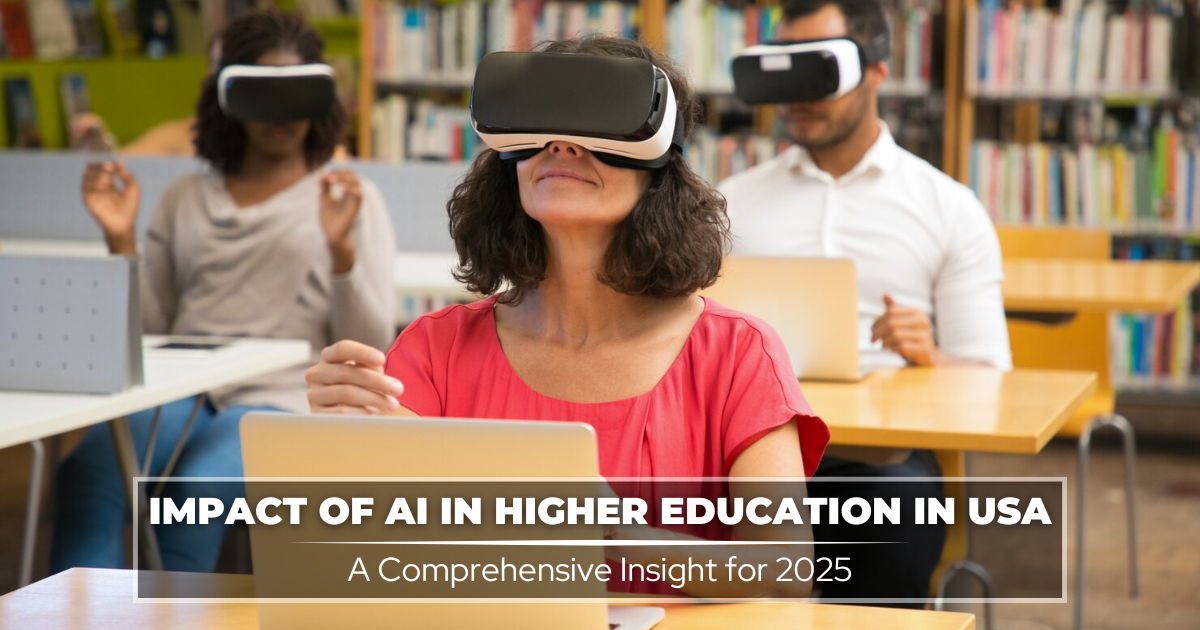The integration of artificial intelligence (AI) into higher education is one of the most transformative changes in the academic landscape. As universities across the US adopt AI technologies, both students and faculty are witnessing a revolution in teaching, learning, administration, and career preparation. AI in higher education in the US is not just a trend; it is a significant development that has the potential to reshape educational experiences, streamline administrative processes, and enhance career opportunities for students.
In this blog, we will explore the impact of AI in higher education in the US, including how it is changing learning methods, the role of AI in faculty development, ethical considerations, and the future of AI in universities. Whether you are a student, a teacher, or a university administrator, understanding these trends is important to understand the future of higher education.
What is AI and How Does it Work in Education?
AI, or artificial intelligence, refers to the ability of machines to perform tasks that typically require human intelligence. These tasks can include problem-solving, pattern recognition, learning from data, and natural language processing. AI systems in education are used to optimize learning experiences, enhance teaching methods, automate administrative tasks, and provide personalized feedback.
In the context of higher education, AI technologies are being applied in multiple ways:
- Machine learning helps in predicting student performance based on data patterns.
- Natural language processing (NLP) powers chatbots and AI tutors, providing students with real-time assistance.
- Data analytics is used to assess learning trends and improve institutional performance.
- Automated grading systems reduce the burden on faculty and ensure timely feedback.
AI in higher education in the USA is revolutionizing how both students and faculty interact with learning materials and each other, making education more accessible and efficient.
How AI is Transforming Learning Methods in the USA
AI is reshaping the way students learn by providing personalized, interactive, and accessible educational experiences. From smart classrooms to adaptive learning technologies, AI is taking education beyond traditional methods and tailoring learning to individual needs.
Personalized Learning
Personalized learning is perhaps the most significant impact of AI in education. AI-powered platforms use data analytics to understand a student’s learning style, strengths, and weaknesses, tailoring lessons and resources accordingly. For example, platforms like Coursera and edX use AI to suggest courses to students based on their preferences and past activities.
In the US, many universities are incorporating AI-powered tools into their curriculum to enhance the learning experience. AI algorithms can suggest resources, adjust the pace of lessons, and provide feedback, ensuring that each student receives an education that suits his or her learning preferences and pace.
Smart Classrooms and Virtual Learning
AI technology is also transforming the traditional classroom into a “smart classroom,” where digital tools, interactive whiteboards, and AI tutors help enhance the learning process. For example, platforms like Google Classroom and Microsoft Teams integrate AI to improve collaboration, streamline communication, and automate repetitive tasks.
Furthermore, as virtual learning and hybrid models become popular, AI plays a vital role in providing real-time support through virtual assistants and AI-powered tutoring systems. Students attending online classes can get instant feedback on assignments and receive assistance through chatbots available 24/7.
Automated Grading Systems
One of the challenges faced by teachers is the time-consuming task of grading assignments, quizzes, and exams. AI-powered grading systems now help mitigate this problem by automating the grading process. These systems can analyze essays, dissertations, and even short answers using NLP and provide fair, efficient grading.
In the US, many universities have adopted AI-based grading tools that provide instant feedback on assignments, giving both students and instructors more time to focus on deeper learning.
AI’s Role in Higher Education Administration
Beyond its impact on learning, AI is also transforming the administration of higher education institutions. From streamlining administrative tasks to improving student engagement, AI helps universities run more efficiently and create a better student experience.
Streamlining Administrative Tasks
AI-powered systems at universities handle a wide range of administrative tasks, from scheduling to student registration. These systems use predictive analytics to anticipate student needs, streamline course scheduling, and automate routine administrative processes. For example, AI can help process applications, handle registration forms, and track student progress.
AI chatbots are also playing a key role in student services, answering routine questions about admissions, financial aid, and other queries. By automating these processes, AI frees up valuable time for staff, allowing them to focus on more complex tasks and student interactions.
Admissions and Enrollment Process
The use of AI in the admissions process is also becoming popular. AI is used to analyze application data, assess student performance, and predict student success. Machine learning algorithms help universities identify the most suitable candidates based on past performance, ensuring that they admit students who are most likely to succeed academically.
In addition, AI can help improve diversity and inclusion in admissions by eliminating biases in the application review process. By focusing on data-driven insights, universities can make more objective decisions, ensuring fair access to higher education.
AI’s Impact on Faculty and Teaching Methods
AI not only benefits students but also enhances the teaching experience. Teachers can leverage AI technologies to improve their teaching methods, create more engaging courses, and provide personalized feedback to students.
Enhancing Teaching Efficiency
AI can help professors develop dynamic lesson plans and create engaging content for students. AI-powered tools can suggest relevant readings, provide insights on student performance, and help teachers devise more effective teaching strategies. In addition, AI can assist in creating adaptive learning paths, allowing students to progress at their own pace while receiving targeted support.
AI in Faculty Development
AI is also playing a vital role in the professional development of teachers. AI-powered platforms can offer personalized recommendations for teaching improvement based on data analytics. These systems help faculty members by suggesting new teaching methods, providing insights into classroom performance, and providing targeted training resources to help improve teaching skills.
Ethical Considerations and Challenges of AI in Higher Education
While AI brings many benefits, it also presents ethical challenges that must be carefully addressed. The adoption of AI in higher education must be approached carefully to ensure that it enhances educational experiences rather than hinders them.
Bias and Fairness in AI Algorithms
One of the biggest concerns surrounding AI in education is the potential for bias in AI algorithms. AI systems, like any other technology, are only as good as the data they are trained on. If these algorithms are trained on biased data, they can perpetuate existing inequities. It is important that universities address this issue by using unbiased, representative data and regularly auditing their AI systems to ensure fairness.
Data Privacy and Security
AI systems collect large amounts of data on students, so there are concerns about data privacy and security. Universities must ensure that student data is secure and that AI systems comply with data protection laws such as the Family Educational Rights and Privacy Act (FERPA). Transparency in how student data is used and clear guidelines on data storage and access are essential to protect students’ privacy.
AI’s Impact on Career Opportunities and the Job Market
As AI is shaping education, it is also impacting the job market and the skills sought by employers. Higher education institutions in the United States are increasingly incorporating AI-related programs and courses into their curriculum to prepare students for future careers in AI, data science, and technology.
Preparing Students for an AI-Powered Workforce
The future job market will require professionals with expertise in AI, data science, and related fields. Universities are responding to this demand by offering specialized programs that equip students with the skills needed to thrive in an AI-driven workforce. Programs such as AI, machine learning, and robotics are becoming a core part of the curriculum at top universities in the United States.
AI in Career Services
AI is also improving career services at universities. AI-powered platforms assist students with personalized job recommendations, internship placements, and networking opportunities. By analyzing student profiles and career preferences, these systems can match students with employers and career paths that align with their skills and aspirations.
The Future of AI in Higher Education in the USA
As AI technology continues to evolve, its role in higher education will expand. By 2025, we can expect to see even more sophisticated AI systems that will further revolutionize the way students learn, the way teachers teach, and the way universities operate.
AI Innovations on the Horizon
Emerging trends include AI-powered virtual campuses, where students can engage in immersive learning experiences without stepping foot on campus. AI can also play a big role in research, helping academics analyze data and develop new insights more efficiently.
Predictions for AI in Education by 2025
By 2025, AI is expected to be deeply embedded in all aspects of higher education. From fully automated administrative systems to virtual professors powered by AI, the future of education is going to be more accessible, efficient, and tailored to each individual’s needs.
Conclusion
AI is already having a profound impact on higher education in the US, and this is just the beginning. As AI technologies continue to develop, we can expect even more changes in how education is delivered, how institutions operate, and how students are prepared for the workforce. While challenges such as bias, data privacy, and security remain, the potential of AI to improve education is undeniable. For students, educators, and universities, adopting AI offers exciting opportunities to enhance learning experiences, streamline operations, and better prepare for the future.
Frequently Asked Questions (FAQs)
Q. What is AI in higher education?
A. AI in higher education refers to the use of artificial intelligence technologies to enhance teaching, learning, and administrative tasks.
Q. How does AI improve student learning experiences in the USA?
A. AI personalizes learning, provides immediate feedback, and adapts to individual learning needs, making education more efficient and accessible.
Q. Can AI replace teachers in higher education?
A. AI is meant to complement, not replace, teachers by automating tasks and providing personalized learning experiences, allowing educators to focus on teaching.
Q. What are the ethical concerns with AI in higher education?
A. Ethical concerns include AI bias, data privacy, and the need for transparent and fair AI algorithms in educational settings.
Q. How will AI shape future job markets and higher education?
A. AI will drive demand for new skills in data science and technology, and universities are increasingly offering specialized programs to equip students for AI-powered careers.
Check out our comprehensive guide on the Best Online Universities in USA for Distance Learning

